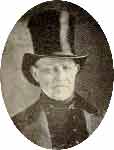Judah Touro
(1775 - 1854)

According to Judah Touro's tombstone, he is inscribed in “the Book of Philanthropy, to be remembered forever.” No epitaph could be more deserving. Touro's name is indelibly associated with American Jewish philanthropy, a community trait of which American Jews can be proud.
Touro grew up in Newport, Rhode Island, the second son of Isaac Touro, who was hazzan of Yesuat Israel, Newport's Sephardic synagogue. The Revolutionary War destroyed Newport's prosperity, and Judah's childhood was marked by poverty. A Tory, Judah's father remained with his family in Newport after the British captured the city. The Touros became dependent on the charity of British troops, who ultimately helped the Touros relocate to Jamaica, West Indies, where Isaac died in 1783. His mother took Judah and his siblings to Boston to live with her brother, Moses Michael Hays.
When Judah's mother died in 1787, Hays raised the Touro children. He taught Judah and his brother Abraham to observe Jewish traditions and apprenticed them in his international commercial ventures. In 1801, Judah unexpectedly left for New Orleans. No one is certain why he left in such haste, but the gossip of the time had it that his uncle refused to allow him to marry his first cousin, Catherine Hays. In any case, Touro never married.
When the U.S. acquired New Orleans in 1803, its economy boomed, and Judah established himself as a merchant, shipper and leader in local social life. During the war with England in 1812, Touro fought as a volunteer under the command of General Andrew Jackson. In the great battle of Jan. 1, 1815, Touro was severely wounded and near death, but over the next year a close friend nursed Touro back to health. The wound appeared to have had psychological as well as physical effects: The previously social Touro withdrew almost entirely from civic life and devoted himself to his businesses.
Despite his success, Judah always remembered his youthful poverty and lived modestly. He invested in real estate but never mortgaged his properties to finance other ventures. Touro was reported to have said, “I have saved a fortune by strict economy, while others had spent one by their liberal expenditures.”
In his 50s and 60s, most of Judah's charity was directed to non-Jewish causes. Most significantly, he donated the final $10,000 needed to complete the Bunker Hill Monument in Boston, which for nearly 20 years had languished as an unfinished stump for want of funding. He made a major gift to the public library in his native Newport, and in New Orleans he contributed to a number of Protestant churches and to the building of the Catholic cathedral.
In his early 70s, his life was significantly influenced by his acquaintance with two outstanding Jewish leaders. Touro developed a friendship with Gershom Kursheedt of New Orleans and conducted a correspondence with Rabbi Isaac Leeser of Philadelphia. These men convinced Touro of the importance of being Jewish in more than words. Touro helped found congregation Nefuzoth Yehuda in New Orleans, which followed the Sephardic rituals of his youth. He subsequently built its synagogue and began to attend services regularly, provided the land and funds for its religious school, bought land for its cemetery and annually made up for any deficits incurred. He also founded the city's Jewish hospital, the Touro Infirmary.
In the last year of his life, Touro wrote a will which set the standard of American Jewish philanthropy. After modest bequests to family members and friends, Touro donated the bulk of his fortune to strengthen Jewish life. He left $100,000 to the two leading Jewish congregations and Jewish benevolent organizations in New Orleans. Another $150,000 went to Jewish congregations and charitable institutions in 18 other cities around the United States. He directed that $60,000 be dispensed to relieve poverty and provide freedom of worship to Jews in Palestine. He also left bequests to non-Jewish institutions such as Massachusetts General Hospital, which his brother had helped found.
At his request, Touro was buried with his family in Newport. One of his legacies made it possible to reopen and restore the long-abandoned Newport synagogue where his father had served as hazzan and which now bears the family name. The Jewish Encyclopedia observes that, in his day, “No American Jew had ever given so much to so many agencies and causes; nor had any non-Jew done so much in such varied ways.”
Sources: American Jewish Historical Society


